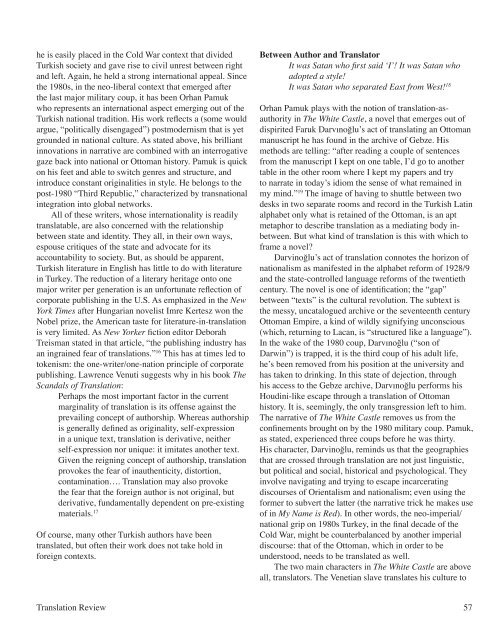Translation Review - The University of Texas at Dallas
Translation Review - The University of Texas at Dallas
Translation Review - The University of Texas at Dallas
You also want an ePaper? Increase the reach of your titles
YUMPU automatically turns print PDFs into web optimized ePapers that Google loves.
he is easily placed in the Cold War context th<strong>at</strong> divided<br />
Turkish society and gave rise to civil unrest between right<br />
and left. Again, he held a strong intern<strong>at</strong>ional appeal. Since<br />
the 1980s, in the neo-liberal context th<strong>at</strong> emerged after<br />
the last major military coup, it has been Orhan Pamuk<br />
who represents an intern<strong>at</strong>ional aspect emerging out <strong>of</strong> the<br />
Turkish n<strong>at</strong>ional tradition. His work refl ects a (some would<br />
argue, “politically disengaged”) postmodernism th<strong>at</strong> is yet<br />
grounded in n<strong>at</strong>ional culture. As st<strong>at</strong>ed above, his brilliant<br />
innov<strong>at</strong>ions in narr<strong>at</strong>ive are combined with an interrog<strong>at</strong>ive<br />
gaze back into n<strong>at</strong>ional or Ottoman history. Pamuk is quick<br />
on his feet and able to switch genres and structure, and<br />
introduce constant originalities in style. He belongs to the<br />
post-1980 “Third Republic,” characterized by transn<strong>at</strong>ional<br />
integr<strong>at</strong>ion into global networks.<br />
All <strong>of</strong> these writers, whose intern<strong>at</strong>ionality is readily<br />
transl<strong>at</strong>able, are also concerned with the rel<strong>at</strong>ionship<br />
between st<strong>at</strong>e and identity. <strong>The</strong>y all, in their own ways,<br />
espouse critiques <strong>of</strong> the st<strong>at</strong>e and advoc<strong>at</strong>e for its<br />
accountability to society. But, as should be apparent,<br />
Turkish liter<strong>at</strong>ure in English has little to do with liter<strong>at</strong>ure<br />
in Turkey. <strong>The</strong> reduction <strong>of</strong> a literary heritage onto one<br />
major writer per gener<strong>at</strong>ion is an unfortun<strong>at</strong>e refl ection <strong>of</strong><br />
corpor<strong>at</strong>e publishing in the U.S. As emphasized in the New<br />
York Times after Hungarian novelist Imre Kertesz won the<br />
Nobel prize, the American taste for liter<strong>at</strong>ure-in-transl<strong>at</strong>ion<br />
is very limited. As New Yorker fi ction editor Deborah<br />
Treisman st<strong>at</strong>ed in th<strong>at</strong> article, “the publishing industry has<br />
an ingrained fear <strong>of</strong> transl<strong>at</strong>ions.” 16 This has <strong>at</strong> times led to<br />
tokenism: the one-writer/one-n<strong>at</strong>ion principle <strong>of</strong> corpor<strong>at</strong>e<br />
publishing. Lawrence Venuti suggests why in his book <strong>The</strong><br />
Scandals <strong>of</strong> <strong>Transl<strong>at</strong>ion</strong>:<br />
Perhaps the most important factor in the current<br />
marginality <strong>of</strong> transl<strong>at</strong>ion is its <strong>of</strong>fense against the<br />
prevailing concept <strong>of</strong> authorship. Whereas authorship<br />
is generally defi ned as originality, self-expression<br />
in a unique text, transl<strong>at</strong>ion is deriv<strong>at</strong>ive, neither<br />
self-expression nor unique: it imit<strong>at</strong>es another text.<br />
Given the reigning concept <strong>of</strong> authorship, transl<strong>at</strong>ion<br />
provokes the fear <strong>of</strong> inauthenticity, distortion,<br />
contamin<strong>at</strong>ion…. <strong>Transl<strong>at</strong>ion</strong> may also provoke<br />
the fear th<strong>at</strong> the foreign author is not original, but<br />
deriv<strong>at</strong>ive, fundamentally dependent on pre-existing<br />
m<strong>at</strong>erials. 17<br />
Of course, many other Turkish authors have been<br />
transl<strong>at</strong>ed, but <strong>of</strong>ten their work does not take hold in<br />
foreign contexts.<br />
Between Author and Transl<strong>at</strong>or<br />
It was S<strong>at</strong>an who fi rst said ʻIʼ! It was S<strong>at</strong>an who<br />
adopted a style!<br />
It was S<strong>at</strong>an who separ<strong>at</strong>ed East from West! 18<br />
Orhan Pamuk plays with the notion <strong>of</strong> transl<strong>at</strong>ion-asauthority<br />
in <strong>The</strong> White Castle, a novel th<strong>at</strong> emerges out <strong>of</strong><br />
dispirited Faruk Darvınoğluʼs act <strong>of</strong> transl<strong>at</strong>ing an Ottoman<br />
manuscript he has found in the archive <strong>of</strong> Gebze. His<br />
methods are telling: “after reading a couple <strong>of</strong> sentences<br />
from the manuscript I kept on one table, Iʼd go to another<br />
table in the other room where I kept my papers and try<br />
to narr<strong>at</strong>e in todayʼs idiom the sense <strong>of</strong> wh<strong>at</strong> remained in<br />
my mind.” 19 <strong>The</strong> image <strong>of</strong> having to shuttle between two<br />
desks in two separ<strong>at</strong>e rooms and record in the Turkish L<strong>at</strong>in<br />
alphabet only wh<strong>at</strong> is retained <strong>of</strong> the Ottoman, is an apt<br />
metaphor to describe transl<strong>at</strong>ion as a medi<strong>at</strong>ing body inbetween.<br />
But wh<strong>at</strong> kind <strong>of</strong> transl<strong>at</strong>ion is this with which to<br />
frame a novel?<br />
Darvinoğluʼs act <strong>of</strong> transl<strong>at</strong>ion connotes the horizon <strong>of</strong><br />
n<strong>at</strong>ionalism as manifested in the alphabet reform <strong>of</strong> 1928/9<br />
and the st<strong>at</strong>e-controlled language reforms <strong>of</strong> the twentieth<br />
century. <strong>The</strong> novel is one <strong>of</strong> identifi c<strong>at</strong>ion; the “gap”<br />
between “texts” is the cultural revolution. <strong>The</strong> subtext is<br />
the messy, unc<strong>at</strong>alogued archive or the seventeenth century<br />
Ottoman Empire, a kind <strong>of</strong> wildly signifying unconscious<br />
(which, returning to Lacan, is “structured like a language”).<br />
In the wake <strong>of</strong> the 1980 coup, Darvınoğlu (“son <strong>of</strong><br />
Darwin”) is trapped, it is the third coup <strong>of</strong> his adult life,<br />
heʼs been removed from his position <strong>at</strong> the university and<br />
has taken to drinking. In this st<strong>at</strong>e <strong>of</strong> dejection, through<br />
his access to the Gebze archive, Darvınoğlu performs his<br />
Houdini-like escape through a transl<strong>at</strong>ion <strong>of</strong> Ottoman<br />
history. It is, seemingly, the only transgression left to him.<br />
<strong>The</strong> narr<strong>at</strong>ive <strong>of</strong> <strong>The</strong> White Castle removes us from the<br />
confi nements brought on by the 1980 military coup. Pamuk,<br />
as st<strong>at</strong>ed, experienced three coups before he was thirty.<br />
His character, Darvinoğlu, reminds us th<strong>at</strong> the geographies<br />
th<strong>at</strong> are crossed through transl<strong>at</strong>ion are not just linguistic,<br />
but political and social, historical and psychological. <strong>The</strong>y<br />
involve navig<strong>at</strong>ing and trying to escape incarcer<strong>at</strong>ing<br />
discourses <strong>of</strong> Orientalism and n<strong>at</strong>ionalism; even using the<br />
former to subvert the l<strong>at</strong>ter (the narr<strong>at</strong>ive trick he makes use<br />
<strong>of</strong> in My Name is Red). In other words, the neo-imperial/<br />
n<strong>at</strong>ional grip on 1980s Turkey, in the fi nal decade <strong>of</strong> the<br />
Cold War, might be counterbalanced by another imperial<br />
discourse: th<strong>at</strong> <strong>of</strong> the Ottoman, which in order to be<br />
understood, needs to be transl<strong>at</strong>ed as well.<br />
<strong>The</strong> two main characters in <strong>The</strong> White Castle are above<br />
all, transl<strong>at</strong>ors. <strong>The</strong> Venetian slave transl<strong>at</strong>es his culture to<br />
<strong>Transl<strong>at</strong>ion</strong> <strong>Review</strong> 57

















